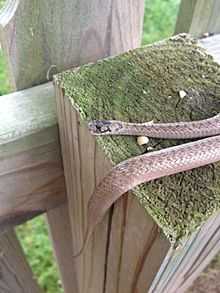Storeria
| Storeria | |
|---|---|
 | |
| Texas brown snake, Storeria dekayi texana | |
| Scientific classification | |
| Kingdom: | Animalia |
| Phylum: | Chordata |
| Subphylum: | Vertebrata |
| Class: | Reptilia |
| Order: | Squamata |
| Suborder: | Serpentes |
| Family: | Colubridae |
| Subfamily: | Natricinae |
| Genus: | Storeria Baird & Girard, 1853 |
| Synonyms | |


Storeria is a genus of colubrid snakes, endemic to North America and Central America. The genus consists of four species, three of which are known as brown snakes, and the other of which is known as the redbelly snake.
Geographic range
They are found in the eastern half of the United States and southern Canada and range south through Mexico and northern Central America.[2]
Etymology
The genus is named in honor of American physician and naturalist David Humphreys Storer (1804–1891).[2][3]
Description
As their common name implies, most snakes of the genus Storeria are a variant of brown in color. The brown can vary depending on locale, to be almost a brick red in color, to nearly black. They sometimes have a lighter colored stripe down the center of the back, and small black blotches along the body, and just behind the head. Their underside is usually lighter brown colored, yellow, or in the case of redbelly snakes, reddish in color. They rarely grow beyond 12 inches in length. One of the best means of identification is by its scales. Snakes in the genus Storeria have keeled scales. On the head there is no loreal scale and the postnasal scale touches the preocular scale. So, there are only two scales between the nasal opening and the eye.
Ecology
Within their range, brown snakes are a very commonly found species of snake. They are most frequently found under leaf litter or debris piles, and are sometimes turned up during gardening. They consume a variety of invertebrate prey, including, earthworms, snails and slugs. Their only means of defense are flattening of the body and excretion from the anal scent glands.[4][5] Brown snakes give birth to live young.[2]
Species
- brown snake, Storeria dekayi (Holbrook, 1836)
- Storeria dekayi anomala Dugès, 1888
- Storeria dekayi dekayi (Holbrook, 1836) - northern brown snake
- Storeria dekayi limnetes Anderson, 1961 - marsh brown snake
- Storeria dekayi temporalineata Trapido, 1944
- Storeria dekayi texana Trapido, 1944 - Texas brown snake
- Storeria dekayi tropica Cope, 1885
- Storeria dekayi victa O.P. Hay, 1892 - Florida brown snake
- Storeria dekayi wrightorum Trapido, 1944 - midland brown snake
- Storeria hidalgoensis Taylor, 1942 - Mexican yellowbelly brown snake
- Storeria occipitomaculata (Storer, 1839) - redbelly snake
- Storeria occipitomaculata obscura Trapido, 1944 - Florida redbelly snake
- Storeria occipitomaculata occipitomaculata (Storer, 1839) - northern redbelly snake
- Storeria occipitomaculata pahasapae H.M. Smith, 1963 - Black Hills redbelly snake
- Storeria storerioides (Cope, 1866) - Mexican brown snake
Gallery
References
- ↑ Wright AH, Wright AA. 1957. Handbook of Snakes of the United States and Canada. Ithaca and London: Comstock. 1,105 pp. (in two volumes). (Genus Storeria, pp. 696-697).
- ↑ 2.0 2.1 2.2 Ernst, Carl H. (2012). "Storeria". Catalogue of American Amphibians and Reptiles (900): 900.1–900.14.
- ↑ Beolens B, Watkins M, Grayson M. 2011. The Eponym Dictionary of Reptiles. Baltimore: Johns Hopkins University Press. xiii + 296 pp. ISBN 978-1-4214-0135-5. (Genus Storeria, p. 255).
- ↑ Schmidt KP, Davis DD. 1941. Field Book of Snakes of the United States and Canada. New York: G.P. Putnam's Sons. 365 pp. (Genus Storeria, pp. 227-230).
- ↑ Conant R. 1975. A Field Guide to Reptiles and Amphibians of Eastern and Central North America, Second Edition. Boston: Houghton Mifflin. xviii + 429 pp. ISBN 0-395-19979-4 (hardcover), ISBN 0-395-19977-8 (paperback). (Genus Storeria, p. 153).
Further reading
- Baird SF, Girard CF. 1853. Catalogue of North American Reptiles in the Museum of the Smithsonian Institution. Part I.—Serpents. Washington, District of Columbia: Smithsonian Institution. xvi + 172 pp. (Storeria, new genus, p. 135).
External links
- Brown Snake (Storeria dekayi ) Species account from the Savanna River Ecology Laboratory Herpetology Program (University of Georgia). Accessed April 6, 2014.
- Genus Storeria at The Reptile Database
- Brown Snake - Storeria dekayi Species account from the Iowa Reptile and Amphibian Field Guide.





